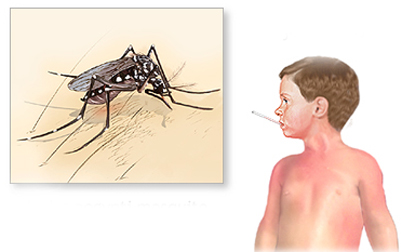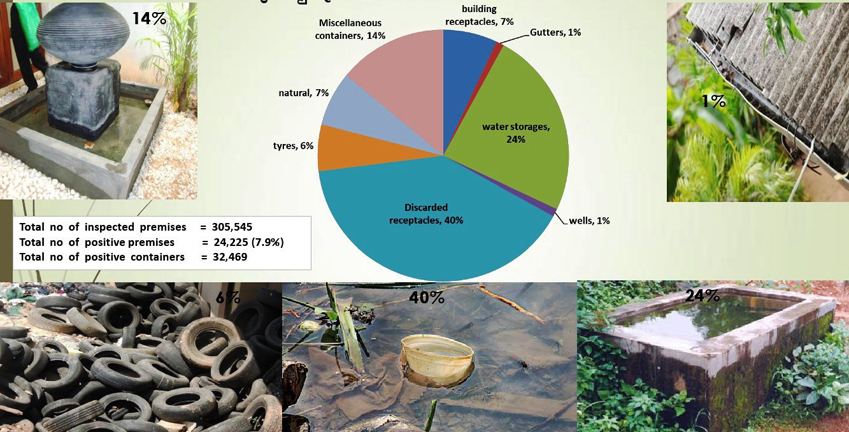Clean neighbourhoods, key to Prevent dengue
Introducing new vaccine requires careful assessment -
National Dengue Control Unit
By Carol Aloysius
Despite recent interventions by the Health Ministry resulting in a drastic drop
in suspected dengue fever cases, dengue fever is still widely prevalent with
whole population at highest risk.
 The Sunday Observer asked experts from the National Dengue Control unit headed
by Dr Hasitha Tissera to explain why the Health Ministry is wary about
introducing the WHO endorsed Dengvaxia, said to be the world’s first dengue
vaccine and already licensed in some countries to prevent the deadly disease. The Sunday Observer asked experts from the National Dengue Control unit headed
by Dr Hasitha Tissera to explain why the Health Ministry is wary about
introducing the WHO endorsed Dengvaxia, said to be the world’s first dengue
vaccine and already licensed in some countries to prevent the deadly disease.
Consultant Community Physician, Dengue Control Unit, Dr Preshila Samaraweera
responding to this question, stressed the importance of preventing the disease
using a simpler and less costly methods - of keeping our environment free of
breeding sites that attract the dengue vector.
Excerpts…
Q.Dengue fever is still widely prevalent in Sri Lanka, with children
increasingly at risk of being infected. The WHO has recently endorsed a vaccine
- Dengvaxia , said to be the world’s first vaccine against dengue. I also
understand that two other trials are being conducted by a Japanese firm and
Glaxo Smith. Is Sri Lanka considering introducing this in the near future?
A. Ministry of Health is considering about the Dengue Vaccine. There is a
National Expert Committee for vaccines. I think the Ministry will take that
decision at the right time.
Injections
Q. Dengavaxia which is a vaccine containing three injections designed for those
over 9 years who have previously been exposed to the virus, has shown 70 percent
effective rate to those with pre-exposure to the disease and 90-95%
effectiveness to those with severe form of dengue. So why are you wary about
introducing it to the immunization program? What are your concerns?
A. As you know, vaccines are given to healthy people. Therefore the most
important thing is the safety of the vaccine. The other aspect is the
effectiveness of the vaccine. That means the vaccine should have the ability to
prevent the disease before it occurs in healthy people through natural
infection.
Q. What considerations do you take into account before a new vaccine is
introduced to the country?
A. Any decision about vaccine introduction to our immunization program, requires
careful assessment at country level, including national and sub national dengue
epidemiology, zero-prevalence rates, model age of the affected group (i.e. the
most affected age group), predicted impact, cost effectiveness with country
specific hospitalization rates affordability and budget impact. This criteria
applies to all new vaccines.
Plunged
Q. Although according to Epidemiology figures, dengue cases have plunged in the
past years in Sri Lanka, over 14,000 suspected cases have been reported this
year alone. What is the reason? Weather conditions? Proliferation of mosquito
breeding sites?
Dengue breeding sites

|
A. The reduction of dengue cases can be due to several reasons: 1) Dengue is
endemic in Sri Lanka. 2) Cases of dengue typically vary throughout the year and
assume a regular pattern normally in association with changes of temperature and
rainfall. 3) Other than that highly urbanized environment with poor solid waste
management system are also contributing factors.4) In addition to all these
factors, the worsening global and regional situation has compounded its spread.
Q. Health officials found several potential breeding sites for the dengue
carrying mosquitoes to lay their larvae during the recent Dengue Control Week.
Who were the biggest offenders? Schools? Government buildings? Private offices?
A. During National Mosquito Control week we have inspected 631,416 premises
which includes 2017 schools, 4288 government Institutes,3274 construction sites,
2641 religious places etc. Of these, 33% of schools, 26% of government
institutes, 42% of construction sites, and 34% of religious places were
identified as having potential breeding places for the dengue mosquito. So to
prevent the disease, all of us must keep our premises free of mosquito breeding
sites.
Q. The highest number of suspected and confirmed cases has for the past several
years, been from the Colombo district. Why? Is it over population? Poor
sanitation? Uncleared garbage? An antiquated drainage system?
A. Yes, all those factors contribute to the higher number of cases in the
Colombo District.
Improper urban planning malfunctioning drainage system, shortage of waste
management programs, and the increase in internal migration, with more rural
based workers migrating to Colombo for work, have collectively resulted in more
breeding places for the mosquitoes.
Strains
Q. The Dengue virus I understand has four strains. Are all four strains found
here?
What are the commonest strains? How can you tell the difference?
A. In Sri Lanka the dominant serotype is DENV 1(80%) and to a lesser extent
Serotype DENV 4(20%.)
Q. Do these strains mutate with every seasonal epidemic?
A. It could happen. But in Sri Lanka most of the time DENV1 and DENV 4 are the
most prevalent strains.
Q. What are the symptoms of dengue fever?
A. Dengue fever can be suspected if you have acute onset of fever with 2 or more
following symptoms; Headache, especially retro-orbital pain, Mayalgia/Athralgia,
Rash (diffuse, erythematous, Macular,) Haemorrhagic manifestations (petechiae,
positive
Q. How do you treat it in the first two days? With home remedies?
A. If you live in a dengue endemic area and if you have fever for more than two
days, you could be a suspect dengue fever patient.
In that case, for the first two days make sure the patient gets adequate bed
rest. Give plenty of fluids (rice cunjee, soup, fruit juices, water etc.) Give
paracetamol (correct dose) 6 hourly with a maximum of 4 doses per day to bring
down temperature Other home remedies would include: tepid sponging to control
fever when it is high despite being given paracetamol.
Make the patient rests under a bed net even during day time to prevent mosquito
bites.
Q. If the fever continues after two days?
A. Consult a qualified Medical Officer.
Q. Are there any drugs that should not be taken in a suspected dengue fever
case?
A. Do not take steroids and non-steroidal anti inflammatory drugs to reduce
fever such as (Aspirin, Ibuprofen, Diclofenac, Sodium, Mefahnamic acid ) orally
or any other route. Do not give red or black coloured food or drink (eg.coffee,
coca cola, etc.)
Q. What are the Do’s?
A. A full blood test should be done at least on the third day of the illness.
But if you are pregnant a full blood count should be done on the first day of
the fever.
Q.When is hospitalization required for dengue?
A. A qualified Medical Officer will decide when to admit the patient to the
hospital.
Q. Symptoms that require hospital admission?
A. *Abdominal pain or tenderness
*Persistent vomiting
*Clinical signs of plasma leakage: pleural effusion and ascites,
*Mucosal bleeding
*Lethargy, restlessness
Other than that pregnant women, elderly patients, obese patients, patients with
other chronic diseases and patients with adverse social circumstances may need
admission even without above criteria.
Q. Are flu shots the same as a vaccine to prevent dengue?
A. No not at all. Flu shots are different and they have to be given every year
as the strains differ from one year to another. But dengue virus does not change
like that. It has only 4 sero-types.
Q. Some people believe certain native herbs can cure dengue. Your comments?
A. I personally don’t believe in any other treatment for dengue, unless there is
evidenced base data after clinical trials.
Goals
Q. I understand there is a National Plan to control Dengue. Can you give us an
outline of that plan and your goals?
A.The Ministry of Health will be working on to achieve and maintain low
mortality rate and to bring down current morbidity level.To achieve that target
Ministry of Health has adopted five strategies: namely Vector Surveillance and
Integrated Vector Management, Disease Surveillance, Disease management, Inter-sectoral
Coordination and Social Mobilization with Outbreak response communication.
Q. You mentioned there was a loss of confidence in the public after the rubella
vaccine failure some years ago. Has the level of confidence come up to
expectation now?
A. Yes definitely. Current level of acceptance for the Expanded Program of
Immunization is very high.
Q. Your advice to the public on what to do and not do if they suspect they have
dengue?
A. Eliminating all mosquito breeding sites in your neighbourhoods is the first
step to preventing dengue fever. It is important to prevent mosquito breeding
places as most patients’ houses have been infested with breeding sites. For
further information contact the National Dengue Control Unit T.P 2368417. |

